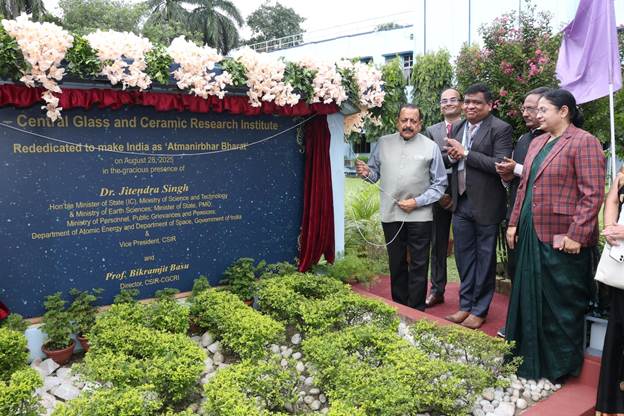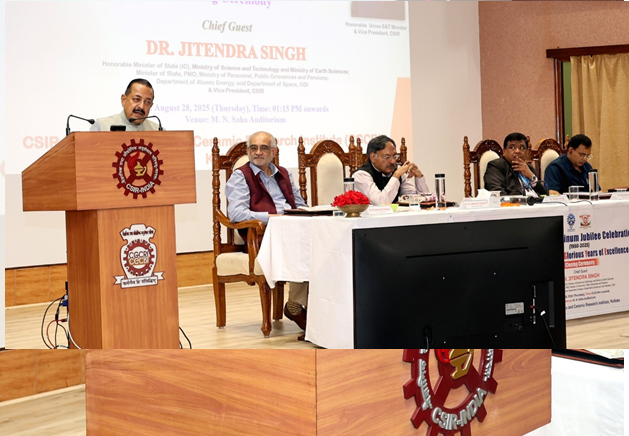Innovation, Research Must Break Silos, Partner with Industry: Dr. Jitendra Singh at CGCRI Jubilee
Innovation, Research Must Break Silos, Partner with Industry: Dr. Jitendra Singh at CGCRI Jubilee
Kolkata, August 28: The CSIR-Central Glass & Ceramic Research Institute (CGCRI), Kolkata, concluded its year-long Platinum Jubilee celebrations today with Union Minister of Science and Technology and Earth Sciences Dr. Jitendra Singh urging deeper collaboration between scientific institutions and industry to drive India’s future technological growth.
Addressing the closing ceremony at the M.N. Saha Auditorium here, Dr. Jitendra Singh said India’s research institutes must expand beyond government dependence and actively partner with industry to sustain innovation and ensure long-term impact. Citing examples such as lavender cultivation in Jammu & Kashmir and vaccine development, he underlined how industry linkages from the outset have helped convert research into viable livelihood opportunities and market-ready solutions.
“Institutional research cannot progress in silos. Wider integration with other science departments and industry partners is essential if we are to keep pace with the demands of emerging fields like semiconductors, green hydrogen, and quantum technologies,” Dr. Jitendra Singh said, adding that CGCRI’s work with glass and ceramics has applications ranging from healthcare to defence and renewable energy.
The Minister noted that since its establishment in 1950 as one of CSIR’s earliest laboratories, CGCRI has played a pivotal role in India’s development journey—from supporting traditional glass and ceramic industries to pioneering high-tech innovations. Its contributions include indigenous development of optical glass, insulating bricks from waste, radiation-shielding glass, and bio-ceramics for implants and healthcare. He highlighted CGCRI’s alignment with major national missions, including Atmanirbhar Bharat, Digital India, Startup India, Swasth Bharat, Jal Jeevan Mission and Make in India, and pointed to the institute’s international collaborations across Europe, USA, and Asia as well as its recent hosting of the International Congress on Glass 2025.
Earlier in the day, Dr. Jitendra Singh unveiled a commemorative plaque titled “Rededicating to the Nation” and visited select CGCRI facilities in the areas of energy, healthcare, and radome technologies. The formal ceremony began with lamp lighting and a welcome address, followed by special remarks from Prof. Indranil Manna, Vice Chancellor of BIT Mesra, and Prof. Suman Chakraborty, Director of IIT Kharagpur, during which MoUs were signed with CGCRI to strengthen collaborative research. Prof. Ashutosh Sharma of IIT Kanpur, serving as Chairman of the Research Council, also addressed the gathering, while a video message from former CSIR Director General Dr. Shekhar C. Mande was screened. On the occasion, the Minister released the Pan-CSIR Safety Manual and presented annual and platinum jubilee recognitions, before delivering his keynote address. The programme concluded with a vote of thanks, the national anthem, and a press interaction.
Looking ahead, the Minister said CGCRI is well-placed to contribute to India’s future missions through technologies such as advanced ceramics for semiconductors, solid oxide electrolyser cells for the green hydrogen mission, 3D printing, and quantum materials. He emphasized that the institute must continue to train young researchers, support startups and artisans, and ensure India remains at the forefront of innovation as the nation advances toward Viksit Bharat 2047.
“CGCRI’s legacy is a reminder that science and innovation can shape the destiny of a nation. With its wide spectrum of applications, the institute is uniquely positioned to contribute to India’s journey through the Amrit Kaal and beyond,” he remarked.
The Platinum Jubilee celebrations, which began last year, marked 75 years of CGCRI’s contributions to the nation in the field of glass and ceramic science.

